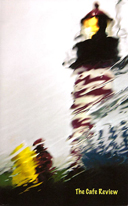Letter to Pavlov’s Dog

by Marija Sanderling
How does it feel
To live with this mad Russian
On whom we pay homage
For because of him
And because of you
We now know
A bell can make you drool?
Are you plagued, then, by all bells?
The moment you try to impress
That sassy poodle in the lab
Two doors down
Who has a limp but still maintains
Her youthful figure
And you googly – eye her
When, across the street, the schoolmaster
Rings a bell to call in errant students
You drool, and she looks away.
Jazz Night at the Museum

by Leonore Hildebrandt
For the modernist, an egg shattered in the street.
A heart? Straggling notes court the monkey tree.
“It may take sixty years until the bamboo
finally blooms,” you say, “and then the whole plant dies.”
The dimly – lit blues ballad murmurs intimacies:
sea lavender in gilded frames.
A break, and the man in the vintage hat
works the crowd: a trumpeter from Moscow!
Three horns — their fictions prolifically bounding up
grand stairs and corridors, to the landscapes —
the field – rubble after winter, a sky over – clouding —
to rosy bathers, nudes draped on luscious cloth.
Outside, taxis. We circumvent downtown’s clusters,
its ravines and cliffs funneling a harsher wind —
installations in a troubled key.
Hunched Over Shallows

by Jeff Hardin
(Columbia, Tennessee)
I must have looked ridiculous, hunched over
the shallows, steering a red Solo cup
behind the minnows smart enough to spurt
just past the come – up – empty sudden rush
I stumbled thick – kneed against the water’s weight.
Except when I got close, they didn’t seem
to care that I was there at all, just stilled
themselves as if the creek were thinking them.
I think it was. Just now I had that thought,
itself refracting silvered flashes out
of reach, and just as then it seems I’ll waste
all afternoon, not tire of watching thwarts
and bursts regain a poise of being there —
as if I’m not! — the keen stream flowing past.
August is Why
by David Filer
There’s a certain Slant of light,
Winter Afternoons —
— Emily Dickinson, Poem #258
Don’t take too much from
a still Spring evening.
There have been others.
Spring is like that:
at first it takes one’s
breath away, the eyes
see nothing but love’s
object. Not love even,
that comes much later.
We’re talking about
desire, and desire —
as it comes to all —
is like a still Spring
evening, the held warmth
of it, the silence
just this side of rage.
We don’t want to talk
about rage in the same
breath as Spring, it goes
against tradition,
against the silence
that comes before tears.
Talk instead about
the drifting thistle
seed, one of many.
Talk instead about
the cedar waxwing,
in the backyard ash
tree. Something’s going
on, there’s even been
some rain, and August
has crept in on us,
insects fill the air,
behind them, pastel clouds
picking up the last
sunlight of the day —
August already,
in its hot splendor —
already, when we
were talking about
Spring, talking about
desire, as if it were
love, or something as
small as the cedar
waxwing in the ash,
and silent, like rage,
and August is why
there will be Winter,
just visible now
in the curling brown
edges of the leaves,
in the slant of light
through the pastel clouds.
Don’t take too much from
a still Spring evening,
and don’t talk about
desire, or love, or
that one thistle seed
drifting across . . . and
don’t talk about rage.


